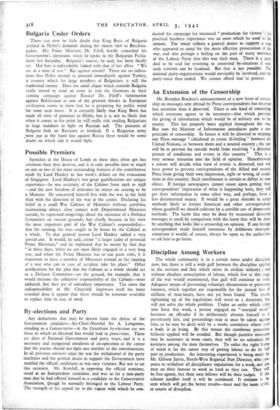By-elections and Party
Any deductions that may be drawn from the defeat of the Government candidate—Air-Chief-Marshal Sir A. Longmore, standing as a Conservative—in the Grantham by-election are not those to which an electoral loss would lead in peace-time. These are days of National Government and party truce, and it is a necessary and recognised condition of co-operation at the centre that the parties should not fight one another in the constituencies. In all previous contests since the war the withdrawal of the party machines and the general desire to support the Government have enabled the official candidates to win easy victories. But not so on this occasion. Mr. Kendall, in opposing the official nominee, stood as an Independent candidate, and was so far a non-party man that he had offered himself as a candidate to the Conservative Association, though he normally belonged to the Labour Party. The strength of his appeal lay in the vigour with which he con- ducted his campaign for increased "production for victory "; his practical business experience was an asset which he. used to the utmost The result reflects a general desire to support a man who appeared to stand for the more effectiye prosecution of the war, and also perhaps a feeling on the part of many members of the Labour Party that this was their man. There is a great deal to be said for reverting to contested by-elections if only such contests can be localised. But that is not possible. The national party-organisations would inevitably be involved, and the party-truce thus ended. We cannot afford that at present.


























 Previous page
Previous page